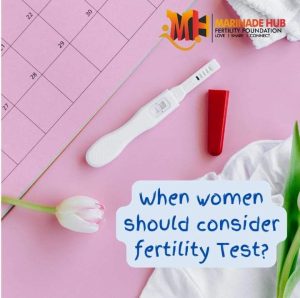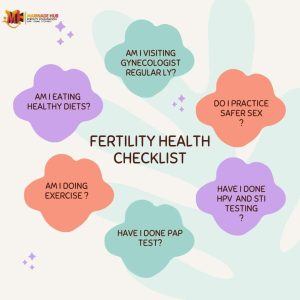
REASONS WHY WOMEN SHOULD CONSIDER FERTILITY TEST
The decision to undergo fertility testing can be influenced by various factors, and it’s not a one-size-fits-all recommendation. However, there are certain scenarios and indicators that may suggest a woman should consider fertility testing. Here are some situations where fertility testing might be considered:
1. Age:
Women who are over 35 may choose to pursue fertility testing if they have been trying to conceive for six months without success. Fertility tends to decline with age, and earlier testing may be recommended for women over 35 due to age-related fertility decline.
2. Irregular Menstrual Cycles:
Women with irregular menstrual cycles or those experiencing very short or long menstrual cycles may consider fertility testing to assess ovulatory function.
3. Known Reproductive Health Issues:
If a woman has a history of conditions that may impact fertility, such as polycystic ovary syndrome (PCOS), endometriosis, or a previous diagnosis of infertility, fertility testing may be considered earlier in the process.
4. Unsuccessful Attempts to Conceive:
Couples who have been actively trying to conceive for a year without success (or six months if the woman is over 35) may consider fertility testing to identify any underlying issues.
5. Male Factor Infertility:
If the male partner has known fertility issues, it may prompt fertility testing for the female partner to assess her reproductive health.
6. Recurrent Pregnancy Loss:
Women who have experienced recurrent pregnancy loss may consider fertility testing to identify potential causes and address any underlying issues.
7. Family Planning Concerns:
Women with a desire to postpone childbearing for personal or career reasons may consider fertility testing to understand their reproductive timeline and make informed decisions about
family planning.
8. Medical Treatments Affecting Fertility:
Women undergoing medical treatments that may affect fertility, such as chemotherapy or radiation therapy, may consider fertility preservation and testing before starting treatment.
9. Personal Choice:
Some women may choose fertility testing as a proactive measure to assess their reproductive health, even if they do not have specific concerns or issues.
It’s important to note that fertility testing is a collaborative decision between a woman and
her healthcare provider. Factors such as individual health, lifestyle, and relationship goals should all be considered. If there are concerns or difficulties with conception, seeking guidance from a fertility specialist or reproductive endocrinologist is advisable. They can provide personalized recommendations and a comprehensive fertility evaluation based on the individual’s circumstances.
I hope this helps you ????
The Marinade Hub cares❤️
#FertilityWellness #TTcJourney


Pingback: FEMALE FERTILITY TESTS: EXPLORING TESTS FOR ASSESSING FEMALE FERTILITY, INCLUDING HORMONE TESTS, OVARIAN RESERVE TESTING AND IMAGING STUDIES – Marinade